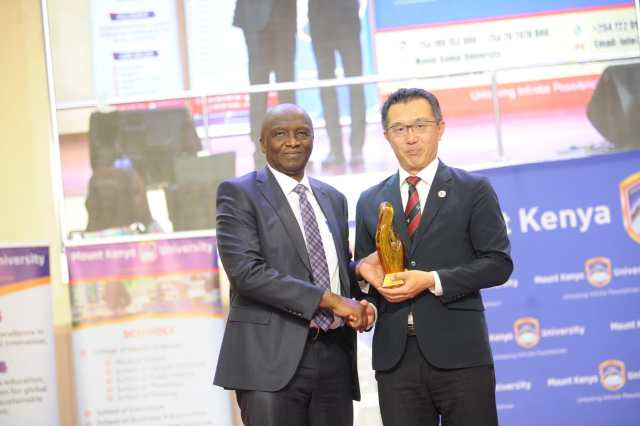The Government of Japan, in collaboration with Kenya’s ministries of Education and Health have launched a state of the art Malaria research laboratory at Mount Kenya University (MKU)’s main campus in Thika town.
The project aims to evaluate an integrated community-directed strategy for malaria elimination in western Kenya and has achieved significant milestones in the fight against the disease.
The new lab at MKU will be funded by the Government of Japan, Japan’s ambassador to Kenya said in Thika on Friday.

The overall project has made substantial investments in the fight against malaria. The total project cost is approximately Ksh 450 million, with Ksh 300 million allocated for activities in Kenya and Ksh 150 million for activities in Japan.
Launching the facility at MKU’s main campus in Thika town, the envoy said he had visited the project site in Homa Bay County and regretted the fact that malaria has been so devastating a disease in Africa.
“I have been briefed about the challenges facing the people of that region from the malaria disease,” he said.
Added Mr Okinawa; “It is disheartening to know that there continues to be so many people suffering from malaria. It is a complete waste of human resources and human lives.”
The ambassador said malaria has been a persistent threat to residents of Nyanza region and many regions of Kenya.
“MKU vice-chancellor Prof Deogratius Jaganyi said the inauguration of the Centre was a testimony of the university’s unwavering commitment to combating one of the world’s most persistent and devastating tropical diseases. He noted that Malaria remains a formidable global health challenge, disproportionately affecting the most vulnerable members of the society, particularly children and pregnant women.

“It ravages communities, undermines economic development and perpetuates a cycle of poverty that we must break. The burden of this disease is not only a health concern but also a social injustice that demands our joint attention and action for eradication,” he said
The VC said MKU has always been at the forefront of addressing societal needs and uplifting communities.
“Today, we reaffirm our commitment to advancing scientific knowledge, fostering innovation and working hand in hand with local communities and global partners to achieve a malaria-free future,” he added.
MKU has postdoctoral candidates and graduate students dedicated to unraveling the complexities of malaria immunity in children and pregnant women.
The VC called upon Kenyans and donors of good will to support the center for sustainability, whether through advocacy, volunteering, or philanthropic contributions so that one day, nobody will ever suffer from malaria, as it will be a thing of the past.
Speaking during the event, MKU Pro-Chancellor, Dr Vincent Gaitho said health is a panacea for development and growth since an unhealthy person cannot perform effectively.
He said the laboratory represents a significant milestone in MKU’s relentless pursuit of excellence, innovation and societal impact.

“We have come together as a community, driven by a shared purpose—to alleviate the burden of disease, eradicate malaria and revolutionize healthcare in our region. Thus, hats-off to the winning team of researchers that brought forth this victory to MKU and Kenya and the region,” Dr Vincent Gaitho said.
In addition to laboratory development, the project has allocated resources for capacity building and training initiatives. Exchange programs for researchers and students between MKU and collaborating Japanese universities, including Osaka City University, have been financially supported.
These programmes aim to enhance the skills and knowledge of individuals involved in malaria research and foster international collaborations.
To strengthen field research capacity, the project has procured field vehicles and mobile research equipment, which has facilitated data collection and surveillance activities in malaria-endemic areas.
It also generating intellectual outputs, including publications and innovations. These contributions have elevated MKU’s profile as a Science and Technology university and have enhanced its webometrics and research rankings.








